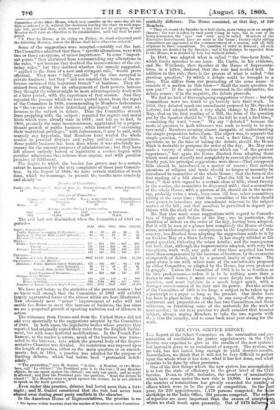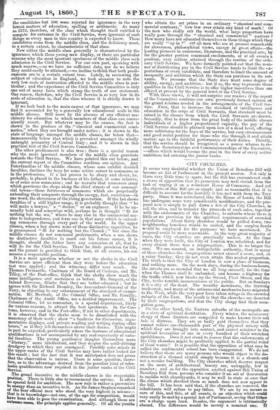THE CIVIL SERVICE REPORT.
LIE Report of the Select 'Committee on the nomination and ex- amination of candidates for junior appointments in the Civll Service was expected to give us the results of the new system ; but instead it gives us an instalment of a report. The system,- we are told, has not lasted long enough to yield decisive results. Nevertheless, we think that it will not be very difficult to gather upoiithe whole what it has done, what it has not done, and what remains to be dene by other processes. One of the first things which the new system has accomplished is to test the state of efficiency in the great level of the Civil Service. Down to 1859, inclusive, the number of nominaticcns which have comeemder the new rule is 10,660. In some cages, the number of -nominations has greatly exceeded the numbcc of offices which were to be the prize of competition. In the past year, for 259 appointments, 1,179 persons competed; for 'nine eleriships in the India Office, 391 persons competed. The ca ises of-rejection -are more important than the causes of acoeptaffice, which we shall touch upon presently. Out of 2479 failures all
the candidates but 106 were .rejected for ignorance in the very lowest matters of education, spelling or arithmetic. As many as 2373, therefore, of the class which thought itself entitled to compete for entrance in the Civil Service, were ignorant of such things as every man in this country is expected to know. These candidates come from the middle class, and the deficiency must, to a certain extent, be characteristic of that class. Now either the middle class generally is characterized by the ignorance which these young men display, or there are particular reasons why the most ignorant specimens of the middle class seek admission to the Civil Service. For our own part, speaking with much reserve,—as we have no sufficient data, nor do we believe they could easily be attained,—we incline to think that both predi- caments are to a certain extent true. Lately, in reviewing the subject of education in England, we took occasion to note the very low scale of instruction afforded to the middle class in par- ticular; and the experience of the Civil Service Committee is only one out of many facts which stamp the truth of our statement. One reason, therefore, why the Civil Service is so very low in its scale of education is, that the class whence it is chiefly drawn is ignorant. If we look back to the main causes of that ignorance, we may find it accounted for by a generally low educational scale in the middle olasses. Still more by the absence of any efficient ma- chinery for education to which members of that class can conve- niently resort. But whatever may be the causes, the fact is shown in the produce of the ," classical and commercial semi- naries," when they are brought under notice ; it is shown in the state of language amongst the middle classes, far below that— immeasurably below that which is prevalent amongst the wholly untaught peasantry of Central Italy ; and it is shown in this practical test of the Civil Service Committee.
The other predicament is also true ; there is a special reason why the more ignorant members of the middle class gravitate towards the Civil Service. We have pointed this out before, and the current report of the Committee confirms our opinion. Any Paterfamilias of the middle classes, whose sons exhibit decided faculties; destines the boys for some active career in commerce or in the professions. If a lad proves to be sharp and clever, he, probably, is placed in the business of his father, of some relative, or of some near connexion ; and he recruits that numerous army which garrisons the shops along the chief streets of our commer- cial towns—those fortresses of commerce which are perpetually extending their conquests through the energy, tact, smartness—in one word, the cleverness of the:rising generation. If the lad shows faculties of a still higher range, it is probably thought that " he will make a lawyer," a "doctor," or an engineer. If he be un- usually bold and somewhat wild, perhaps he is thought "fit for nothing but the sea," where he may rise in the commercial ma- rine to independence, and form one in that navy which is extend- ing commerce through every part of the world. In the upper classes, when a boy shows none of these distinctive capacities, he is pronounced "fit for nothing but the Church ; " but since the middle classes do not command preferments, when a son shows no distinctive faculties to mark out his future career, it is thought, should the father have any connexion at all, that he will do for the Civil Service. There he finds provision for life, and the parent is gratified to think that, at all events, his son secures a respectable position. It is a moot question whether or not the clerks in the Civil Service are more efficient than they were before the education test was applied ; and the witnesses differ very much. Sir Thomas Fremantle, Chairman of the Board of Customs, and Mr. Tilley, of the Post-office, think that the clerks show much the same intelligence and usefulness as before. Mr. Sargent, of the Inland Revenue, thinks that they are better educated ; but he agrees with Sir Richard Bromley, the Accountant-General of the Navy, in objecting to any enhancement of the standard of exami- nation. Mr. Merivale, of the Colonial Office, and Mr. Romilly, Chairman of the Audit Office, see a decided improvement. The Colonial Office, let us remember, is a special department, likely for various reasons, to attract the best specimens. In the Cus- toms, however, and in the Post-office, if not in other departments, it is observed that the clerks seem to be dissatisfied with the monotony of their work ; show "a fondness for discussion, argu- mentative displays, and private reading and writing during office hours," as if they felt themselves above their duties. This might in part be expected, particularly where the increase of educational qualifioations is not accompanied by any real superiority of natu- ral. faculties. The young gentlemen imagine themselves more "literary," more intellectual, and they despise the quill-driving drudgery to which they are consigned. Possibly some minds in the upper ranks of the Civil Service may have rather looked for this result ; but the fact that it was anticipated does not prove that the observation is untrue. There is some question, there- fore, as to the advantage derived from the peculiar kind of echo- lustre qualification now required in the junior ranks of the Civil Service.
The grand incentive to the middle classes is the respectable position. There is little else to recommend the service. It offers no special field for ambition. The new rule is rather a preventive to energy than an incentive to it. As Sir James Stephen remarked of the four official men who stood the very highest in science— that is in knowledge—not one, at the age for competition, would have been able to pass the examination. And although these are extreme oases, the principle applies generally. Of all the youths
who obtain the set prizes in an ordinary "classical and com- mercial seminary," how few ever attain any kind of mark ! Of the men who really stir the world, what largo proportion have really gone through the "classical and commercial " nurture P How many have not educated themselves in those things which they are really "up in ?" -Of all men who are at present remarkable for cleverness, philosophical views, energy in great affairs—the leading pioneers in commerce, literature, and the practical arts, by far the greater portion command emoluments, or at all events a position, very seldom attained through the routine of the ordi- nary Civil Service. We have formerly pointed out that the man- ner of distributing pay in the Civil Service .tends to limit tha ex- pectations of every candidate, and therefore to limit the amount of incapacity mid ambition which the State can purchase in its ser- vants. We presume -that the State does want some degree of ability., energy, and ambition ; but if so, the way to procure those qualities in the Civil Service is to offer higher incentives than are offered at present by the general level of the Civil Service. With these views, it will not surprise our readers if the report of the Committee confirms our own previously formed opinion on the grand reforms needed in the arrangements of the Civil Ser- vice. First, that to increase the standard of intelligence and education in the corps of Civil Servants, that standard must be raised in the classes from which the Civil Servants are drawn. Secondly, that to draw from the great body of the middle classes individuals of a higher proportioned capacity, the pay of the Civil Service should be planned upon less of a dead level, offering mere subistence for the boys of the service, but easy circumstances and good social position for those who rise through it and attain mature age in the faithful performance of their duties. Thirdly, that the service should be recognized as a source whence to re- cruit the Secretaryships and Commissionerships of the Executive, —offices which would become the goal in the view of every active ambitious lad entering the junior ranks. ,



























 Previous page
Previous page